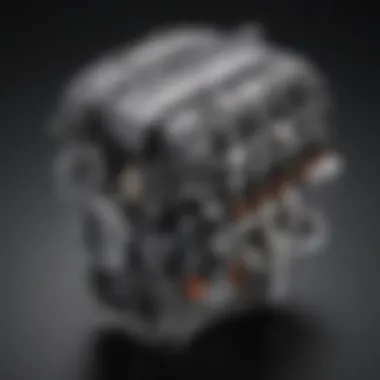In-Depth Look at the 2001 Lexus LS430 Engine Performance


Intro
The 2001 Lexus LS430 engine has gained significant attention among automotive enthusiasts. Its architecture and performance characteristics are of great interest for both current owners and potential buyers. Understanding this engine means appreciating not just its specifications, but also how it has been integrated into the Lexus LS430 model, defining the driving experience. This analysis will dive into every aspect of the engine, providing a comprehensive view of its features, performance, and the contextual competition present in the luxury sedan market of its time.
In-Depth Car Reviews
Overview of the Vehicle
The 2001 Lexus LS430 is more than just a car; it represents a pinnacle of luxury and sophistication in the sedan segment. Built on a robust platform, the LS430 stood out with its size, comfortable interior, and advanced technology. The model captures the essence of Lexus with its emphasis on reliability and quiet performance, riding most smoothly over varied terrain.
Key Specifications
At the heart of the LS430 is a powerful 4.3-liter V8 engine. Key specs include:
- Horsepower: 290 hp at 5,600 rpm
- Torque: 320 lb-ft at 3,400 rpm
- Transmission: 5-speed automatic
- Fuel Economy: Approximately 18 mpg in the city and 25 mpg on the highway
These figures demonstrate not only a healthy power output rather but also commendable efficiency for a luxury sedan.
Performance Analysis
When it comes to performance, the LS430 impresses with its refined acceleration and precise handling. The V8 engine contributes to strong on-road dynamics. Moreover, the engine's responsiveness provides a smooth driving experience, ideal for both city driving and highway cruising. The adaptive air suspension greatly aids in maintaining comfort over various road conditions, ensuring premium comfort for all passengers. It offers a confidence-inspiring feel, quiet operation, and a solid presence on the road.
Interior and Exterior Design
Lexus paid great attention to detail in the design of the LS430. Inside, you can find high-quality materials, soft leather seats, and ample space. Elegant wood trim adds to the vehicle's class. The exterior design reflects traditional luxury styling with a refined shape and tasteful accents. It projects a strong presence while conveying classic elegance.
Safety Ratings and Features
Safety is an integral aspect of the LS430's appeal. The vehicle earned high marks in safety testing, demonstrating Lexus's commitment to occupant protection. Features include:
- Multiple airbags throughout the cabin
- Antilock brakes
- Stability and traction control systems
- Advanced braking technology
These attributes position the LS430 as a worthy competitor in terms of safety among luxury sedans.
The 2001 Lexus LS430 exemplifies a blend of power, refinement, and luxurious comfort in a single vehicle.
Buying Advice
Budget Recommendations
Purchasing a 2001 Lexus LS430 can be a significant financial commitment. Potential owners should analyze the total cost, including insurance, maintenance, and fuel consumption. Aim for a unit priced typically between $8,000 to $15,000, based on mileage and condition.
Financing Options
Many financing options are available for new buyers. Prospective purchasers might consider loans through credit unions or established financial institutions. Evaluate terms and conditions carefully to find the right match for financing the Lexus impressively.
Best Time to Buy
Timing your purchase can yield considerable savings. Car markets often fluctuate, and prices tend to dip during the fall and winter months. This suggests that looking to buy during these periods may result in better deals, providing added value for interested buyers.
Resale Value Considerations
While the LS430 predates many of today’s technologies, its resilience still retains a decent resale value. Regular professional maintenance stands as a critical factor in obtaining good returns should selling become a consideration in the future.
Comparing Similar Models


When considering similar models, readers may look at the 2001 BMW 7 Series and the Mercedes-Benz S-Class from the same timeframe. Competitive features, performance attributes, and price should weigh into the final decision regarding vehicle selection. Knowing this context assists potential buyers in viewing their options critically.
Car Maintenance Tips
Regular Maintenance Schedule
To keep the LS430 in prime condition, adhere to regular maintenance schedules. Recommended services include oil changes, tire rotations, and other essential checks at 5,000-mile intervals.
DIY Tips and Tricks
Perform certain maintenance tasks. Routine fluid checks and maintaining tire pressure can save small but important costs in the long run. Avoid neglecting minor issues, as they can escalate if ignored.
Common Problems and Solutions
Be aware that some LS430 models have reported steering issues and electrical faults. Diagnosing problems early will help in managing repair costs effectively. Establish a connection with a good mechanic familiar with Lexus vehicles for lasting solutions.
Importance of Professional Maintenance
Even with thorough DIY efforts, professional service remains essential for major repairs. Certified Lexus technicians can ensure utmost reliability and take care of complex matters effectively.
Seasonal Maintenance Practices
Change engine oils before season changes to protect the engine. Check tires regularly, especially before winter, ensuring they are appropriate for varying conditions.
In essence, understanding the 2001 Lexus LS430 engine not only informs potential buyers but also serves car enthusiasts longing to delve deeper into its intricacies and engineering milestones.
Prelude to the Lexus LS430 Engine
The 2001 Lexus LS430 engine is a significant part of the Lexus brand's offerings that merits detailed exploration. This introduction seeks to provide a thoughtful overview of the engine's importance relative to both the Lexus LS430 model and its standing within the luxury sedan market. The Lexus LS430 engine demonstrates Toyota's renowned engineering prowess, coupling performance capabilities with reliability and comfort. Further examination reveals how the design choices and engineering innovations affect the overall driving experience.
Purpose of the Article
The purpose of this article is multifaceted. First, it aims to dissect the technical features of the 2001 Lexus LS430 engine, giving readers a comprehensive understanding of what makes it function effectively. An additional aim is to highlight performance characteristics that define its effectiveness on the road, as performance is a crucial aspect for potential buyers.
Moreover, this article endeavors to identify common issues inherent in the model's engine, empowering current owners with critical maintenance insights while ensuring that prospective buyers are well-informed. By exploring comparisons between the LS430 engine and those of its peers, this article seeks to provide context, enhancing readers' understanding of the luxury sedan landscape in the early 2000s.
Target Audience
This article is designed primarily for automotive enthusiasts and new car buyers. Enthusiasts seek knowledge about the mechanical details that enhance performance and driving experience. They value both technical specifications and anecdotal evidence revealing the engine's behavior under various conditions.
New car buyers may have a deeper interest in the reliability and running costs of the LS430. They wish to ensure their investment is sound, prioritizing engines that demonstrate longevity and efficiency. Providing detailed insights will assist both audiences in making informed decisions regarding their interaction, whether it be ownership or simply appreciation of this luxury vehicle.
Technical Specifications Overview
The Technical Specifications Overview section serves as a foundation for understanding the 2001 Lexus LS430 engine. Engine specifications influence many aspects of vehicle performance, including power distribution, fuel efficiency, and overall driving dynamics. By dissecting these specifications, readers gain insight into how engineers designed the LS430 engine to cater to luxury and performance.
Engine Type
The engine fitted in the 2001 Lexus LS430 is categorized as a V8, specifically a 4.3-liter 3UZ-FE. This type of engine configuration is notable for its balance between power and smooth operation. V8 engines are preferred in luxury vehicles due to their robust performance capabilities and refined driving experience. Each of the eight cylinders contributes to the power output, ensuring that the engine delivers robust acceleration while maintaining a comfortable ride for passengers.
Displacement and Configuration
With a displacement of 4.3 liters, the LS430 engine dimensions foster a design intended for balance and speed. The inline design of the V8 configuration allows for enhanced air intake and reduced mechanical drag. This scientifically considered configuration promotes efficiency without sacrificing power. Displacement plays a key role in determining the engine's appropriate torque characteristics, impacting driving experience during both urban rides and highway cruising.
Power Output and Torque


The power output of the 2001 Lexus LS430 engine stands at an impressive 290 horsepower, accompanied by 320 lb-ft of torque. This allows for invigorating acceleration often sought by enthusiasts. The torque provides essential power for merges, overtaking, and smooth driving up hills. It generates enough force to propel the luxurious sedan seamlessly, retaining the brand's hallmark driving pleasure in virtually all conditions.
Fuel Efficiency Ratings
Fuel efficiency in the 2001 Lexus LS430 is rated at approximately 18 miles per gallon in the city and 25 on the highway. These ratings give a competent view of its efficiency for a luxury V8 sedan. Given its power ratings, these numbers stand reputable, especially considering competitor luxury vehicles of that era. This efficient trait ensures that owners do not have to choose between spirited driving and fuel economy; the LS430 offers a capable mix of both.
Overall, the technical specifications outline the brilliance of the LS430 engine. They unveil the marriage of performance and luxury that defines Lexus.
Performance Characteristics
The section on Performance Characteristics is essential in evaluating the driving and operational capability of the 2001 Lexus LS430 engine. Performance aspects greatly influence how the vehicle feels on the road, shaping the overall ownership experience for potential buyers and enthusiasts alike. Examining elements such as acceleration, speed, and transmission mechanics illuminates the dynamics of daily driving in various scenarios—from city cruising to more swift highway travels. These characteristics dictate not only performance metrics but also establish the desirability and reliability of this luxury vehicle within competitive markets.
Acceleration and Speed
The acceleration of the 2001 Lexus LS430 is notably smooth and responsive. It is powered by a 4.3-liter V8 engine capable of producing 290 horsepower and 320 lb-ft of torque. The transition from a complete stop to driving speed requires intricate engineering for enhancements in performance: 0-60 mph acceleration typically hovers around 6.7 seconds. This rate stands impressive, especially in the luxury sedan segment, where comfort and performance unite rather than compete.
Transmission System
The LS430 incorporates a five-speed automatic transmission. This system plays a crucial role in maintaining engine efficiency and enhancing performance. Intelligent query and control mechanisms ensure that gear shifts are well-timed, promoting a sense of continuous acceleration versus delayed response. Furthermore, gear ratios facilitate a balance of power and cruising efficiency that supports generally good fuel ratings even at higher speeds.
Driving Experience
The driving experience in the LS430 is tailored to maintain elegance and comfort across various conditions. The suspension setup effectively absorbs road imperfections while encouraging precise handling. Integrated features such as stability control and active traction systems foster a level of confidence for the driver. Thus, regardless of whether navigating urban traffic or embarking on long-distance travels, the vehicle offers a cohesive driving experience that resonates with expectations from a luxury brand.
"The Lexus LS430 merges performance aspects with refined driving traditions, embodying the true essence of luxury rides through its engineered responses and driver interactions."
An assessment of performance characteristics underlines how they serve as indicators of trustworthiness and pleasure within the LS430's operating parameters, making it a compelling choice for automotive enthusiasts and new car buyers alike.
Common Issues and Maintenance
Understanding common issues and maintenance practices is crucial for any prospective owner or enthusiast of the 2001 Lexus LS430. This segment provides insights into potential engine-related problems, highlights effective maintenance practices, and lays out recommended service intervals. Mastering these aspects can lead to a better ownership experience and a longer lifespan for the vehicle.
Typical Engine Problems
The LS430, while renowned for its quality, is not without potential engine problems. Owners should be aware of signs indicating issues that may arise as the vehicle ages. Here are some typical engine problems:
- Oil Leaks: Over time, rubber gaskets and seals wear out. These leaks can lead to engine damage if not addressed promptly.
- Overheating: Faulty cooling systems or low coolant levels may cause the engine to overheat. This can result in severe engine damage if running conditions do not improve.
- Misfiring: Engine misfires can stem from ignition or fuel delivery issues. This condition might cause a noticeable decrease in performance.
- Transmission Faults: While indirectly related to the engine, transmission problems can affect overall performance and should not be overlooked.
Routinely checking for these issues and maintaining the engine as specified can enhance reliability and avoid excessive repair costs later.
Maintenance Practices
Implementing proper maintenance practices is essential for the health of the Lexus LS430 engine. Regular monitoring and upkeep prevent minor issues from escalating into significant problems. Key practices include:
- Regular Oil Changes: Changing the engine oil according to the manufacturer's recommendations can significantly extend engine life and ensure optimum performance.
- Regular Fluid Checks: Monitoring coolant, power steering fluid, and transmission fluid levels is essential. Adequate fluid levels help in maintaining performance and preventing potential damage.
- Air and Fuel Filter Replacement: Air and fuel filters need checking and, if necessary, replacement at regular intervals to ensure that the engine runs smoothly and efficiently.
- Inspection of Belts and Hoses: Engine belts and hoses should be inspected frequently for wear or damage. They play a critical role in engine operation and failure can lead to substantial engine issues.
Performing these practices consistently not only improves the engine's performance but also ensures longevity and reduces the risk of serious issues arising.
Recommended Service Intervals
To keep the engine performing optimally, service intervals are crucial. The LS430 typically follows these recommended service intervals:
- Engine Oil Filter Change: every 5,000 miles or six months.
- Coolant Flush: every 30,000 to 50,000 miles.
- Fuel Filter Replacement: every 20,000 miles to ensure effective filtration.
- Brake Fluid Change: every two years, if not indicated sooner by warning lights or signals.
The LS430 thrives on schedule adherence. Ignoring these intervals may result in decreased performance and eventually costly repairs.


Following the recommended service intervals lets the owner manage wear-and-tear more effectively while also enhancing the driving experience. A well-maintained engine not only performs better but is also a sign of a reliable ownership experience.
Comparison with Rival Vehicles
Understanding how the 2001 Lexus LS430 engine stacks up against its contemporaries provides valuable context for both automotive enthusiasts and potential buyers. The luxury sedan market in the early 2000s was competitive, and analyzing rival vehicles helps clarify the strengths and weaknesses of the LS430. This section will discuss crucial competitor models, delve into performance benchmarks, and examine the value proposition for prospective owners.
Competitors from the Era
During its release, the LS430 competed against several notable luxury sedans. Some key competitors included:
- BMW 7 Series (E65): Known for its performance-oriented approach, this model offered an array of engine choices but at the cost of a more complex ownership experience.
- Mercedes-Benz S-Class (W220): Renowned for luxury and advanced technology, the S-Class presented a refined driving experience but often involved higher maintenance costs.
- Audi A8 (D2): This vehicle emphasized all-wheel drive and spaciousness, appealing to buyers seeking a balanced ride along with practicality.
These models each brought unique features and performance traits that catered to different market segments. Understanding their specifications and performance metrics can be crucial for anyone looking to compare them directly to the LS430.
Performance Comparisons
In comparing performance characteristics, the LS430 stands out in several key areas. For example:
- Power and Torque: The LS430's 4.3L V8 engine produces up to 290 horsepower and 320 lb-ft of torque, making it competitive against similar engines in the BMW 750i and Mercedes S500.
- Acceleration: While the LS430 may not be the sportiest, acceleration from 0-60 mph in approximately 6.5 seconds is respectable for its class, especially compared to the more aggressive power delivery of the BMW.
- Handling: The LS430's suspension systems prioritize comfort, setting it apart from competitors that aim for a sportier feel. However, the steering feedback may be less engaging than that found in the handles of the BMW or Audi.
This performance landscape highlights the LS430's strength as a premium luxury vehicle rather than a sport sedan. It caters more to a comfortable ride than outright speed.
Price versus Value Analysis
Pricing is crucial when it comes to establishing the overall value of a vehicle. The lists below outline considerations for Aspirants of the Lexus LS430:
- Initial Cost: The LS430’s MSRP was generally lower compared to the higher-end S-Class models while offering similar luxury and technology features.
- Depreciation: Lexus models are known to depreciate slower than many competitors. Thus, a used LS430 may present substantial value compared to some BMW or Mercedes offerings that can drop more significantly in price.
- Ownership Costs: Factors such as maintenance, insurance, and fuel efficiency factor into total ownership. While Lexus often has better reliability ratings, some competitors may incur higher maintenance due to advanced features.
In summary, the 2001 Lexus LS430 presents a compelling case for buyers not just for its initial pricing but for its overall value proposition in the enduring market. By juxtaposing these elements with its rivals, prospective owners gain a clearer insight into potential effectiveness and cost-benefit over time.
"In the luxury sedan sector, understanding how cars stack up against one another directly informs the buying experience, making it critical to assess rival models effectively."
Innovations and Technology
The integration of innovations and technology in the 2001 Lexus LS430 engine marks a significant step in automotive engineering. Recognizing the importance of such elements enhances the driving experience and ensures reliability. This section delves into specific advancements in engine features and the role electronics play in optimizing performance. By understanding these components, automotive enthusiasts and prospective buyers gain essential insights into the LS430's engine capabilities.
Engine Technology Features
At the core of the LS430's appeal are its advanced engine technology features. The LS430 is powered by a 4.3-liter V8 engine manufactured under the Toyota brand, representing quality and precision.
Key Specifications include:
- Type: V8, SOHC 4-Valves per Cylinder
- Displacement: 4,300 cc
- Maximum Horsepower: 290 hp at 5,600 RPM
- Torque Output: 320 lb-ft at 3,400 RPM
One notable feature is the Dual VVT-i (Variable Valve Timing with Intelligence) system, which aids in enhancing performance, fuel efficiency, and lower emissions. This system adjusts the timing of the intake and exhaust valves for better power delivery across various engine speeds. Another technological advancement involves the use of individual throttle plates for each cylinder, which supports improved throttle response and overall engine performance.
Key Benefits:
- Enhanced fuel efficiency
- Smoother acceleration
- Improved power delivery
Role of Electronics in Engine Performance
Electronics have become a fundamental element in modern engines, and the LS430's engine is no exception. Advanced electronic control units manage various engine functions, improving fuel efficiency and reducing emissions. The Engine Control Module (ECM) is crucial in several areas, including:
- Fuel Injection Control: The ECM calculates the ideal fuel-to-air ratio, contributing to an efficient burning process.
- Ignition Timing Management: Proper timing helps in achieving optimum power levels without causing engine knock, ensuring better and safer performance.
- Emissions Control: By monitoring various systems, it ensures compliance with emissions standards while maximizing performance.
Through lectronics, the LS430 can adapt to different driving conditions. The responsiveness of the engine is significantly enhanced stemming from the accurate data collected, leading to smooth gear transitions and a refined driving experience.
Overall, the blend of engine technology features with electronic management systems showcases the meticulous engineering behind the 2001 Lexus LS430, underscoring its standing as a noteworthy player in the luxury sedan market.
"The advancements in technology not only enhance performance but redefine the standards for luxury vehicles."



